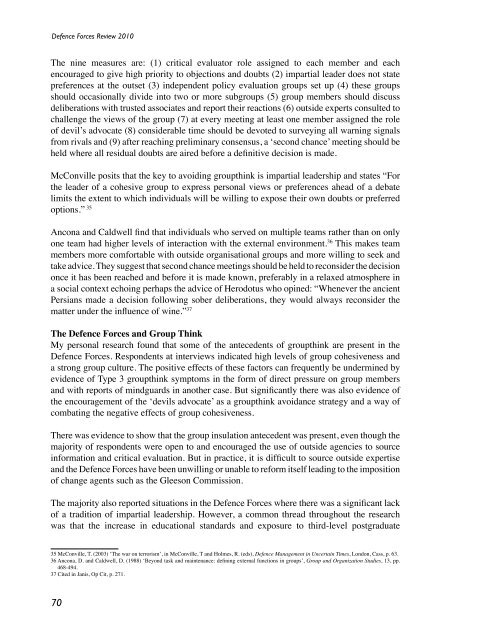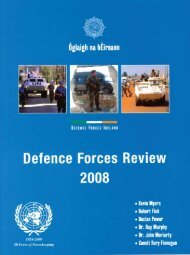Defence Forces Review 2010
Defence Forces Review 2010
Defence Forces Review 2010
You also want an ePaper? Increase the reach of your titles
YUMPU automatically turns print PDFs into web optimized ePapers that Google loves.
<strong>Defence</strong> <strong>Forces</strong> <strong>Review</strong> <strong>2010</strong>The nine measures are: (1) critical evaluator role assigned to each member and eachencouraged to give high priority to objections and doubts (2) impartial leader does not statepreferences at the outset (3) independent policy evaluation groups set up (4) these groupsshould occasionally divide into two or more subgroups (5) group members should discussdeliberations with trusted associates and report their reactions (6) outside experts consulted tochallenge the views of the group (7) at every meeting at least one member assigned the roleof devil’s advocate (8) considerable time should be devoted to surveying all warning signalsfrom rivals and (9) after reaching preliminary consensus, a ‘second chance’ meeting should beheld where all residual doubts are aired before a definitive decision is made.McConville posits that the key to avoiding groupthink is impartial leadership and states “Forthe leader of a cohesive group to express personal views or preferences ahead of a debatelimits the extent to which individuals will be willing to expose their own doubts or preferredoptions.” 35Ancona and Caldwell find that individuals who served on multiple teams rather than on onlyone team had higher levels of interaction with the external environment. 36 This makes teammembers more comfortable with outside organisational groups and more willing to seek andtake advice. They suggest that second chance meetings should be held to reconsider the decisiononce it has been reached and before it is made known, preferably in a relaxed atmosphere ina social context echoing perhaps the advice of Herodotus who opined: “Whenever the ancientPersians made a decision following sober deliberations, they would always reconsider thematter under the influence of wine.” 37The <strong>Defence</strong> <strong>Forces</strong> and Group ThinkMy personal research found that some of the antecedents of groupthink are present in the<strong>Defence</strong> <strong>Forces</strong>. Respondents at interviews indicated high levels of group cohesiveness anda strong group culture. The positive effects of these factors can frequently be undermined byevidence of Type 3 groupthink symptoms in the form of direct pressure on group membersand with reports of mindguards in another case. But significantly there was also evidence ofthe encouragement of the ‘devils advocate’ as a groupthink avoidance strategy and a way ofcombating the negative effects of group cohesiveness.There was evidence to show that the group insulation antecedent was present, even though themajority of respondents were open to and encouraged the use of outside agencies to sourceinformation and critical evaluation. But in practice, it is difficult to source outside expertiseand the <strong>Defence</strong> <strong>Forces</strong> have been unwilling or unable to reform itself leading to the impositionof change agents such as the Gleeson Commission.The majority also reported situations in the <strong>Defence</strong> <strong>Forces</strong> where there was a significant lackof a tradition of impartial leadership. However, a common thread throughout the researchwas that the increase in educational standards and exposure to third-level postgraduate35 McConville, T. (2003) ‘The war on terrorism’, in McConville, T and Holmes, R. (eds), <strong>Defence</strong> Management in Uncertain Times, London, Cass, p. 63.36 Ancona, D. and Caldwell, D. (1988) ‘Beyond task and maintenance: defining external functions in groups’, Group and Organization Studies, 13, pp.468-494.37 Cited in Janis, Op Cit, p. 271.70
















